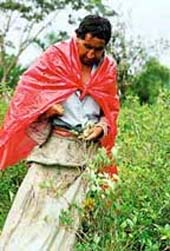The fight against drugs may cause a natural catastrophe in South America
The spraying of coca plant killers threats regional rich biodiversity The US backed fight against drugs in South America is affecting the rich biodiversity of its Andean region and may lead to a natural catastrophe if the permanent spraying of coca plant killers continues. According to an official report issued by Colombia's counter narcotics department, growers are leaving their usual territories and moving into national parks where spraying is banned.
The US backed fight against drugs in South America is affecting the rich biodiversity of its Andean region and may lead to a natural catastrophe if the permanent spraying of coca plant killers continues. According to an official report issued by Colombia's counter narcotics department, growers are leaving their usual territories and moving into national parks where spraying is banned.

Colombian authorities said that farmers are burning huge areas of virgin rain forests within the parks and poisoning rivers with chemicals to continue with the production. In the meantime, pesticides sprayed by authorities keep threatening productive lands and endangered species across the region.
Colombia is home to about 15 percent of all the world's plant species and one of its most diverse arrays of amphibians, mammals and birds. Dozens of species that populate its jungles and Andes Mountains exist nowhere else on the planet. There the fight against the coca, the material raw for cocaine, endangers the life of those who live there and, as shown by recent natural disasters, the life of all who live in this world.
The coca has been planted by peasant farmers for centuries, as a source of traditional medicines. Indian tribes chew coca leaves as an ancient tradition, but traffickers pay more to produce cocaine.
The Colombian government says it is studying whether to lift the ban on spraying. If it doesn't, growers are bound to plant more crops in the reserves. But Indian tribes and environmental advocates contend that spraying would be harmful to the animals and their surroundings. Environmentalists insist the solution is for government workers to destroy the crops with machetes -- a method that has worked in mountainous areas beyond the spray planes' reach.
Other Andean nations are studying the legalization of coca growth in certain areas controlled by the government.
In Peru, the regional governments of Huanuco and Cuzco had declared the coca leaf “cultural patrimony”, but the country's highest court overturned the declaration. But the court also called on President Alejandro Toledo to reevaluate Peru's counter-drug policy, saying drug interdiction and development of alternative crops to steer farmers away from the drug trade are not working.
In the neighbour Bolivia, the government allows farmers to grow the coca leaf with restrictions and the issue is one of the topics of the forthcoming presidential race.
Politicians, economists and environmentalists from South America and the rest of the world have a lot to say about the controversy. The outcome of the debate will have relevant consequences for the global community. One thing is certain, coca farmers will never stop growing the coca leaf.
Photo: A farmer in Bolivia harvests coca.
Subscribe to Pravda.Ru Telegram channel, Facebook, RSS!


